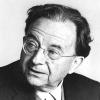The Dialectic of Enlightenment is one of the main texts of what has come to be called the Frankfurt School, a lose collection of thinkers who first congregated around the Institute for Social Research in Frankfurt am Main, Germany. The authors, Max Horkheimer and Theodor Adorno, analyse modern culture from a number of perspectives, addressing mythology, enlightenment, sexuality and liberation, sickness and psychoanalysis.
This article is part of The Ultimate Guide to the Philosophy of Erich Fromm.
If you like reading about philosophy, here’s a free, weekly newsletter with articles just like this one: Send it to me!
The Frankfurt School
The Dialectic of Enlightenment is one of the main texts of what has come to be called the Frankfurt School, although it was neither a school nor located anywhere near Frankfurt for much of the time it was active.
The Frankfurt School is generally taken to mean a lose collection of thinkers who first congregated around the Institute for Social Research in Frankfurt am Main, Germany. The Institute was founded in 1923 with the money of a wealthy student, Felix Weil, but from the beginning the founders sought to integrate the Institute into the formal university system, so that it could offer lectures, attract academics, get research funding and confer academic degrees.
The most prominent of the founding members were Max Horkheimer, who became the Director of the Institute in 1930, musicologist and philosopher Theodor Adorno, psychoanalyst and social psychologist Erich Fromm, whom we already know quite well, and philosopher Herbert Marcuse. Later, many others became loosely associated with the Frankfurt School, for instance Jurgen Habermas, who started out as a doctoral student of Horkheimer but later went his own way and created his own theoretical framework, distancing himself from the Frankfurt School. Erich Fromm, too, was only loosely associated with the School, having his own research program that emphasised psychoanalysis rather than Hegelian and Marxist philosophy and Critical Theory.

Erich Fromm (1900-1980)
Erich Fromm (1900-1980) was a German social psychologist and philosopher who had enormous popular success from the 1950s all the way to the end of his life in 1980. We discuss his work and his relation to Marxism and Freud.
The main topics of the Frankfurt School
The Frankfurt School was, as we said, never a “school” in the narrow sense of having one set of teachings that it promoted through its members.
Instead, it was a loose association of very different thinkers who, for a time, had common research interests and found inspiration and support from working together, despite always also having differences and sometimes fundamental disagreements among them. It was more like a flock of birds who, for a while, find themselves sitting on the same branch of a tree, rather than a pack of wolves that will hunt and …
Read the full article which is published on Daily Philosophy (external link)





